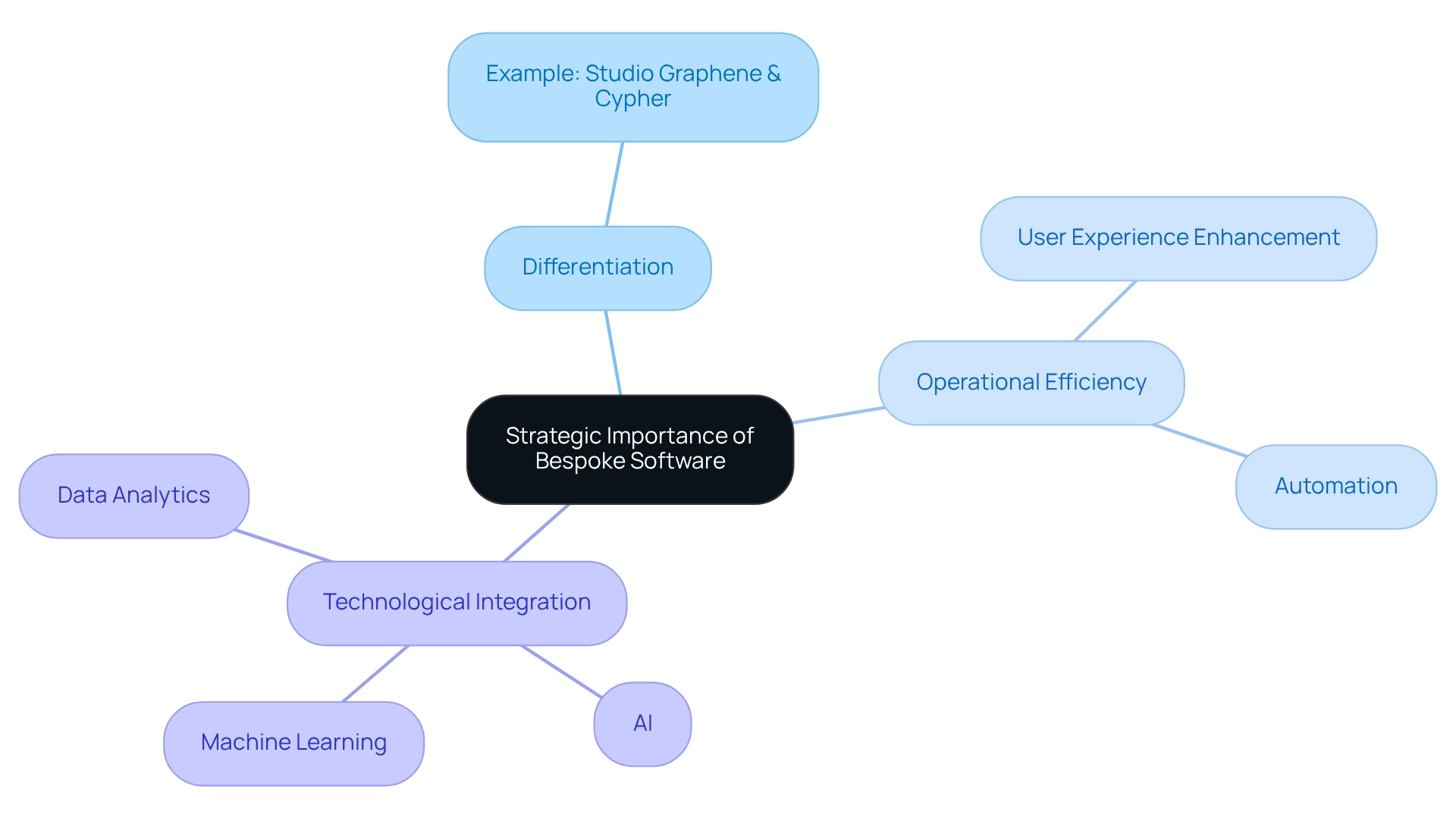AI
our blog
Why Bespoke Software is Essential for Business Success

Overview
Bespoke software is pivotal for achieving business success, as it delivers tailored solutions that significantly enhance operational efficiency and drive innovation. This adaptability enables companies to respond swiftly to evolving market demands. Customized applications not only align seamlessly with unique business processes but also bolster scalability, security, and integration. Consequently, they serve as a strategic asset in competitive markets, positioning organizations for sustained growth and resilience.
Introduction
In an increasingly competitive landscape, the necessity for businesses to distinguish themselves is more urgent than ever. Bespoke software, meticulously crafted to fulfill the unique requirements of an organization, stands out as a formidable tool for driving innovation and enhancing operational efficiency. Unlike generic solutions, custom software effectively tackles specific challenges and workflows, empowering companies to adapt swiftly to market fluctuations.
As organizations allocate a significant portion of their budgets to custom development, the strategic importance of tailored software becomes unmistakable. It not only streamlines processes and boosts productivity but also positions businesses to adeptly navigate compliance and security challenges.
However, the path to bespoke software development is not without its obstacles, necessitating careful planning and unwavering commitment.
This article explores the multifaceted advantages of bespoke software, the challenges it presents, and its crucial role in propelling business growth in today's dynamic environment.
Define Bespoke Software and Its Relevance to Modern Businesses
Bespoke software, also known as custom applications, is meticulously crafted to meet the unique needs of a business or organization. Unlike off-the-shelf solutions designed for a broad audience, bespoke software specifically addresses particular operational challenges and processes. In an era where agility is paramount, bespoke software provides the essential adaptability and personalization necessary to enhance efficiency and foster innovation.
This importance is underscored by the fact that firms allocate approximately 63% of their development budgets to design and new development expenses, reflecting an increasing commitment to bespoke software solutions. As organizations increasingly rely on technology to streamline processes and elevate customer experiences, bespoke software emerges as a strategic asset that enables companies to swiftly adapt to evolving market demands while maintaining a competitive edge.
Furthermore, bespoke software can be created with targeted functionalities that proactively tackle regulatory and compliance challenges, such as:
- automated reporting
- audit trails
- real-time compliance monitoring
This ensures organizations remain compliant while pursuing innovation. However, it is crucial to recognize that bespoke software development may present challenges, including initial costs and extended development timelines.
As Tomas Sire, an Analytics Developer, notes, 'Bespoke software can be created with integration in mind, allowing communication with existing tools and platforms.' Moreover, with 82% of agile teams utilizing continuous integration and continuous delivery tools to ensure quality, the development of bespoke software plays a vital role in enhancing operational efficiency and driving innovation.

Explore the Key Advantages of Bespoke Software for Business Growth
Custom applications present a multitude of benefits that can profoundly influence company growth. Primarily, they offer bespoke software that provides tailored functionality, aligning seamlessly with a company's unique processes and resulting in enhanced efficiency and productivity. Automating routine tasks, for instance, minimizes manual errors and frees up employee time for more strategic initiatives. Statistics reveal that nearly 69% of companies recognize technology personalization as essential for gaining a competitive edge, underscoring the importance of bespoke software solutions.
Moreover, bespoke software applications offer scalability, enabling organizations to adjust their systems as they expand, effectively overcoming the limitations often associated with off-the-shelf products. This adaptability is vital in a rapidly changing market landscape. Improved security stands out as another significant advantage; bespoke software empowers organizations to implement personalized security protocols tailored to their specific needs, thereby safeguarding sensitive information effectively.
Additionally, bespoke software ensures smooth integration with existing systems, fostering continuity while enhancing technological capabilities. A compelling case study is GC Business Finance, which has successfully digitized its loan management processes since 2019, leading to a marked improvement in operational efficiency. Such examples illustrate how customized applications not only boost productivity but also drive innovation and growth, making them a critical investment for businesses aiming for long-term success.

Address Challenges and Considerations in Bespoke Software Development
The creation of bespoke software presents a unique set of benefits alongside significant challenges. A primary consideration is the initial investment; bespoke software solutions often entail higher costs compared to off-the-shelf alternatives. Companies should anticipate extended creation timelines, as developing bespoke software necessitates meticulous planning, design, and thorough testing.
Furthermore, ambiguous requirements or shifting objectives can lead to scope creep, complicating the project journey. To mitigate these risks, effective communication between stakeholders and developers is crucial. In addition, continuous upkeep and enhancements are essential to keep the application relevant and secure, demanding a commitment to long-term support.
By recognizing these challenges, companies can approach bespoke software development with realistic expectations and a strategic mindset, ultimately transforming potential hurdles into opportunities for growth.

Understand the Strategic Importance of Bespoke Software in Competitive Markets
In competitive markets, bespoke software acts as a crucial differentiator, propelling businesses ahead of their competitors. Bespoke software solutions empower organizations to innovate swiftly, address customer needs more efficiently, and optimize operations in ways that standard applications cannot.
For instance, Studio Graphene's partnership with Cypher exemplifies this; they developed a custom web platform for Cypher's online coding camps, significantly enhancing user experience and operational efficiency through automation and innovative technology. This platform was crafted with a user-focused strategy, leveraging React.js, Node.js, and Drupal to meet the diverse requirements of children, teachers, parents, and administrators.
Bespoke software facilitates the integration of advanced technologies such as AI and machine learning, which can streamline processes and provide valuable insights through data analytics. As organizations strive to remain relevant and adapt to market fluctuations, bespoke software evolves from being mere tools to strategic assets that foster sustainable growth and long-term success.
This adaptability is vital; companies that embrace flexibility in their strategic processes are better positioned to navigate complex challenges and seize emerging opportunities. As Vince Lombardi aptly noted, 'The difference between a successful person and others is not a lack of strength, not a lack of knowledge, but rather a lack in will.' This sentiment underscores the significance of customized applications in achieving organizational success.
Additionally, with Studio Graphene's global presence in London, Delhi, Lisbon, and Geneva, businesses can harness diverse perspectives in their software development, further enhancing their competitive advantage.

Conclusion
Bespoke software emerges as an essential component for businesses striving to excel in today's competitive landscape. By providing tailored functionality that aligns with unique operational needs, custom software enhances efficiency, boosts productivity, and ultimately propels business growth. The capacity to automate routine tasks and integrate seamlessly with existing systems not only minimizes manual errors but also liberates valuable employee time for strategic initiatives.
While the journey to bespoke software development may pose challenges, such as higher initial costs and extended timelines, these obstacles can be effectively managed through strategic planning and clear communication. Recognizing the importance of ongoing maintenance and support is crucial to ensure that the software remains relevant and secure over time. Businesses that approach this development process with a realistic mindset can transform potential hurdles into opportunities for innovation.
In summary, bespoke software transcends mere functionality; it is a strategic asset that empowers organizations to respond swiftly to market demands, foster continuous innovation, and maintain a competitive edge. As evidenced by successful case studies, investing in custom solutions is not simply an expense but a commitment to sustainable growth and long-term success. In an era where agility and adaptability are paramount, bespoke software stands as a cornerstone for businesses aiming to achieve their objectives and navigate the complexities of the modern market.









